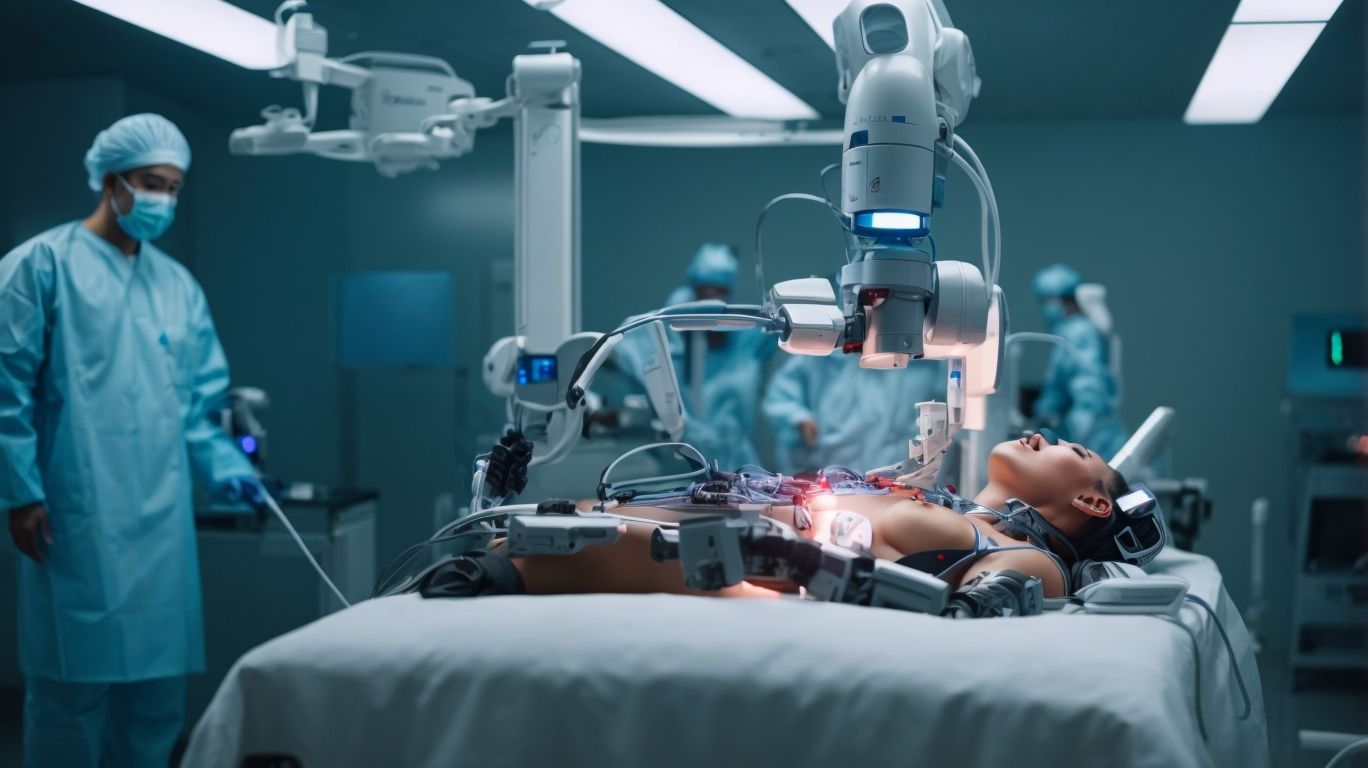Understanding Medical Technology: A Comprehensive Guide for Health Enthusiasts
.jpg)
Medical tech, also known as medtech, covers a lot of tools, equipment, and techniques used in healthcare. From straightforward stuff like thermometers to complex imaging machines and robotic surgery systems, medtech is essential in modern healthcare.
Advances in medtech have revolutionized patient care, improving results. For example, ultrasound machines help docs see internal organs and detect issues. Plus, lab equipment enables accurate diagnosis. Minimally invasive surgery also reduces recovery times and lowers risks.
Medtech also includes medication delivery systems, telemedicine, electronic health records, and data analysis algorithms. This has resulted in more efficient healthcare, greater access to specialized care in remote areas, and improved safety.
Medtech is always advancing, so healthcare pros need to stay informed. This helps them provide better care and improves patient experiences. Offering personalized treatments that meet the individual needs of each patient is also possible when embracing technological advancements.
Take advantage of medical technology. Keep up with the latest trends and breakthroughs to ensure you are providing the best care. Innovation is the key for a brighter future in healthcare.
History of Medical Technology:
Medical tech has an exciting history of centuries. From way back to now, humans have invented tools, devices, and techniques to improve healthcare and save lives. Medical tech innovations have changed the face of medicine, helping doctors to diagnose diseases more accurately, treat patients better, and boost patient care.
An important point in the history of medical tech was the invention of the microscope in the 17th century. This tool let scientists and physicians observe microorganisms for the first time, leading to major discoveries in microbiology and infectious diseases. In the 19th century, anesthesia was introduced, making surgery painless and reducing mortality rates.
Computers came in the mid-20th century and medical tech made another jump. Electronic health records (EHRs) changed how medical info is stored and shared, enhancing communication between healthcare providers and patient care coordination. Plus, imaging techs like X-rays, CT scans, MRIs have improved diagnostic capabilities.
In recent years, medical tech has seen amazing developments. Robot-assisted surgery has become common, allowing surgeons to do complex procedures with precision and minimal invasiveness. Also, telemedicine has grown in popularity, offering remote healthcare services via videoconferencing.
It was Hippocrates who started modern medicine over two thousand years ago. His Hippocratic Oath still guides healthcare professionals today.
Different Types of Medical Technology:
Medical technology is vast! It has tools and techniques used to improve patient care, diagnose diseases and enhance treatment. By combining medical knowledge and technological advancements, healthcare professionals can provide better healthcare services.
Let’s break down types of medical technology:
- Diagnostic Technology: X-ray machines, MRI scanners, ultrasound devices and laboratory tests help identify and analyze diseases or conditions.
- Therapeutic Technology: Devices and treatments designed to cure or manage illnesses. Such as surgical robots, pacemakers, insulin pumps, prosthetic limbs and radiation therapy.
- Assistive Technology: Aids to help people with disabilities lead more independent lives. Wheelchairs, hearing aids, mobility scooters and communication devices are some examples.
- Information Technology: Vital for managing patient records securely and efficiently. EHRs, telemedicine platforms and data analytics software help with healthcare decision making.
- Rehabilitation Technology: Physical therapy equipment, mobility aids and virtual reality tools assist in recovery after illness or injury.
Plus, nanotechnology and genomics have revolutionized the field!
Here’s an inspiring example of medical technology positively impacting a person’s life: John Mitchell suffered from severe hearing loss. He was hesitant about a cochlear implant, but it changed his life! He regained his sense of sound, could participate in conversations, enjoy music and lead a more fulfilling life.
Applications of Medical Technology:
Medical technology is vital to many areas of healthcare. It provides cutting-edge advancements and innovative solutions to prevent, diagnose, treat, and manage diseases. Let’s explore the applications of medical tech!
Imaging uses modern techniques, like MRI and CT scans, to offer detailed visuals of organs and parts. Telemedicine lets healthcare pros assess patients remotely, improving access in rural areas and allowing remote consultations.
Wearable devices, like fitness trackers and smartwatches, measure vital signs and activity levels to promote wellness and detect issues. Robotic-assisted surgeries make complex procedures more precise and reduce recovery times. AI algorithms analyze medical data to help with decisions, predictions, and treatments.
Prosthetics are also a part of medical tech. They provide mobility and functionality for those who have undergone amputations. Plus, cancer treatments have improved thanks to targeted therapies that customize treatments to each patient.
Medical technology is changing healthcare delivery around the world!
Challenges and Ethical Considerations:
Medical Technology has multiple challenges and ethical considerations that need to be thoughtfully handled. These concerns come up because of the intricate nature of healthcare tech and its effect on patients, medical workers, and society.
We can get a better understanding of these issues with a table:
| Challenge | Explanation |
|---|---|
| Data Privacy | The gathering, storing, and sharing of patient info can lead to privacy breaks and unapproved access. Tight measures must be in place to protect personal details. |
| Cybersecurity | With more reliance on tech, medical devices can be vulnerable to cyber-attacks. Adequate measures for safeguarding data and protecting systems from hackers are necessary. |
| Equity in Access | Making sure equal access to medical technology for everyone, no matter their financial standing, is a critical challenge. Innovation and policy changes are needed to bridge this gap. |
| Ethical Use of AI | Using artificial intelligence (AI) in medical technology can create moral dilemmas with decision-making algorithms, bias, accountability, and a decrease in human involvement. |
Also, there are less popular aspects that need to be looked at in the realm of challenges and ethical considerations around medical technology.
One such aspect is the possibility of being overly dependent on tech, which can lead to a decline in compassion and human contact in patient care. Keeping a balance between tech advances and thoughtful healthcare is important.
Additionally, resource allocation is a complex challenge. Insufficient resources can result in inequality among patients in terms of access to cutting-edge treatments or technology. Allocating responsibly while taking individual needs into account is essential.
To handle these issues, a few things can be done:
- Establish strong regulations: Setting strict regulations makes sure data privacy, cyber security, resource allocation guidelines, and ethical use of AI in medical technology are taken care of.
- Encourage interdisciplinary collaboration: Making collaborations between healthcare professionals, tech specialists, moralists, and policymakers will create comprehensive conversations that lead to ethical decisions.
- Continuous education and training: Regular training programs for medical staff can upgrade their understanding of ethical challenges and give them the skills to manage these complexities well.
By following these tips, we can deal with the challenges and ethical considerations related to medical technology, while making sure it is incorporated into healthcare practices safely and ethically.
Impacts of Medical Technology on Society:
Medical tech has revolutionized society, bringing big impacts. These range from better patient care, to enhanced diagnostics and increased access to healthcare services. Plus, personalized treatments are now possible.
| Impacts | Description |
|---|---|
| Improved Patient Care | Innovative devices and treatments mean better patient outcomes. |
| Enhanced Diagnostic Capabilities | Advanced imaging and diagnostic tools give more accurate and early disease detection. |
| Increased Access to Healthcare Services | Remote monitoring and telemedicine let people in remote areas access quality healthcare. |
| Personalized Treatments | Genomic data is utilized to tailor treatment plans to individual needs. |
Mortality rates have lowered due to medical tech, allowing people to live longer and healthier lives. Plus, recovery times are faster, helping patients and their families.
Administrative tasks become more efficient with electronic health records (EHRs) and automated systems. This reduces mistakes and facilitates seamless communication between healthcare professionals.
Medical tech has also created job opportunities in research, development, manufacturing, and maintenance. This brings economic growth.
Fact: The global medical technology market size was valued at $425.5 billion USD in 2020 (Grand View Research, July 2021).
Future of Medical Technology:
The future of medical technology is full of possibilities! Innovations and breakthroughs are expected to bring huge changes in the healthcare industry. Let’s take a look at what we can expect:
- Robotic-assisted surgeries
- Artificial Intelligence aiding diagnosis
- Virtual and Augmented Reality for improved patient experience
- Nanotechnology improving drug delivery methods
- Wearable devices for continuous health monitoring
- Gene Editing Technology for personalized medicine
These advancements are no longer just dreams, but can help improve global healthcare! A report by Deloitte titled “Future-proofing Global Health: The Role of Emerging Technologies” suggests that medical technology will lead to improved patient outcomes, as well as cost savings in the future.
Conclusion:
Medical technology has totally revolutionized healthcare. Innovative gadgets and treatments have greatly improved patient outcomes. Artificial intelligence and robotics give accurate diagnoses and less intrusive operations. Plus, telemedicine has allowed remote access to healthcare.
Medical tech also plays a huge role in public health initiatives. Wearable devices monitor vital signs and physical activity, so individuals can manage their health. Electronic health records streamline communication between healthcare providers, giving better coordination of care and enhanced patient safety. Genetic testing leads to personalized medicine, providing treatments based on the person’s unique DNA.
A great example of medical tech transforming lives is Emily’s story. She had a rare heart condition and traditional options were few and risky. But, with medical advancements, doctors were able to do a minimally invasive procedure with robotic help. This decreased the risks and resulted in a successful outcome for Emily. Her story shows the power of medical technology for improving patient outcomes and quality of life.
Frequently Asked Questions
Q: What is medical technology?
A: Medical technology refers to the use of technology in the field of healthcare to diagnose, treat, and prevent illnesses. It includes various tools, equipment, and techniques used by healthcare professionals to improve patient care and outcomes.
Q: What are some examples of medical technology?
A: Some examples of medical technology include MRI machines, ultrasound devices, robotic surgical systems, artificial limbs, pacemakers, and electronic health record systems. These technologies aid in diagnosis, treatment, and monitoring of patients.
Q: How does medical technology benefit healthcare?
A: Medical technology offers numerous benefits to healthcare. It allows for more accurate and efficient diagnosis, minimally invasive surgeries, improved patient monitoring, enhanced drug delivery systems, and better management of health records. It also contributes to the development of new treatments and therapies.
Q: Is medical technology only used in hospitals?
A: No, medical technology is utilized in various healthcare settings, including hospitals, clinics, research laboratories, and even in patients’ homes. It is used by healthcare professionals across different specialties to provide optimal care to patients.
Q: How is medical technology regulated for safety?
A: In most countries, medical technology is regulated by government agencies to ensure its safety and effectiveness. These agencies establish guidelines for the development, manufacturing, and use of medical devices and technologies. They conduct rigorous testing and evaluation processes before approving them for clinical use.
Q: How is medical technology advancing?
A: Medical technology is constantly advancing due to ongoing research and development. Innovations in areas such as artificial intelligence, telemedicine, genomics, and nanotechnology are revolutionizing healthcare. These advancements aim to improve patient outcomes, increase accessibility, and reduce healthcare costs.
- Vintage Typewriters: The Art and Nostalgia of Manual Typing - October 18, 2023
- Welcome to the Insider! - October 18, 2023
- Explore Lucrative State Farm Careers and Job Opportunities for your Future Success - October 18, 2023


